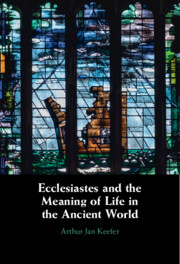Book contents
- Ecclesiastes and the Meaning of Life in the Ancient World
- Ecclesiastes and the Meaning of Life in the Ancient World
- Copyright page
- Dedication
- Contents
- Preface
- Abbreviations
- 1 Introduction
- 2 Suffering and Meaning in Egyptian Literature
- 3 Suffering and Meaning in Mesopotamian Literature
- 4 Suffering and Meaning in Greek Literature
- 5 Ecclesiastes and the Meaning of Life
- 6 Ecclesiastes, Suffering and Joy
- 7 In Context
- Bibliography
- Index of Sources
- Index of Authors and Topics
- References
Bibliography
Published online by Cambridge University Press: 12 April 2022
- Ecclesiastes and the Meaning of Life in the Ancient World
- Ecclesiastes and the Meaning of Life in the Ancient World
- Copyright page
- Dedication
- Contents
- Preface
- Abbreviations
- 1 Introduction
- 2 Suffering and Meaning in Egyptian Literature
- 3 Suffering and Meaning in Mesopotamian Literature
- 4 Suffering and Meaning in Greek Literature
- 5 Ecclesiastes and the Meaning of Life
- 6 Ecclesiastes, Suffering and Joy
- 7 In Context
- Bibliography
- Index of Sources
- Index of Authors and Topics
- References
- Type
- Chapter
- Information
- Ecclesiastes and the Meaning of Life in the Ancient World , pp. 217 - 228Publisher: Cambridge University PressPrint publication year: 2022

